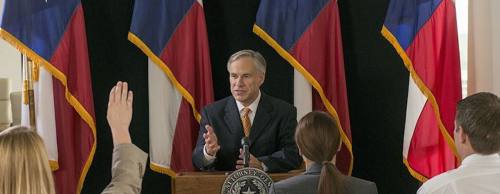Gov. Greg Abbott announced Tuesday afternoon that he would call a special session for lawmakers to address sunset legislation first and foremost starting July 18.
Abbott said once the Texas Senate passes the sunset legislation, which he said should take no longer than three to four days, he will add an additional 19 items to the special session.
These 19 items include bathroom legislation in House Bill 2889 that would regulate usage based on biological gender, property tax reform in Senate Bill 2, school finance reform through a commission to study the topic, school choice for special needs students, mail ballot fraud and local pre-emption that would scale back the power of local governments.
A large number of the 19 items focused on the topic of limiting local government overreach.
"I'm calling for further legislation that fully pre-empts," he said. "We don't need a patchwork quilt of regulations."
Included in this local pre-emption campaign are Abbott's charges to limit annexation without citizen votes; limits on city regulations for tree trimming, changing rules of construction in the midst of projects and the speed of the permitting process; and a call to pass a stronger texting-while-driving ban that would nullify all local ordinances already in existence.
Abbott has been debating the special session since the end of the regular session on May 29, saying in a bill signing that same day that he would be the sole decision-maker on the topic.
"We will be, if we have a special session, convening only on the topics that I choose at the time of my choosing," Abbott said.
This bit is fairly obvious for anyone familiar with Texas politics—only the governor can call a special session, and only he or she can determine what the charges of said session will be.
It gets complicated, however, when a dominant political figure such as Lt. Gov. Dan Patrick comes into the picture.
Throughout the last month of the regular session, Patrick held press conferences demanding the Texas House of Representatives pass legislation that would address rising property taxes and regulate bathroom use based on one's biological gender. Without this action, Patrick threatened to withhold important bills related to the operation of Texas agencies.
The House did not take action, so Patrick did. Patrick held up the sunset bill, which would have renewed the life of several agencies in September. Without its passage, these agencies, including the Texas Medical Board, which is in charge of licensing doctors, will cease to exist at that time.
Abbott indicated only once what topics might carry interest for him in a Bell County GOP dinner speech following the end of the regular session. He spoke of property taxes as the problem that lawmakers have yet to fix.
"I think there is one challenge, one problem, that many Texans face that went unsolved," he said. "It’s complex, but it needs to be addressed, and that is the incredible rise in property taxes in this state."
Lawmakers will return to the Capitol following a six-week break on July 18.




